Politics
About Andrew Cusack
 Writer, web designer, etc.; born in New York; educated in Argentina, Scotland, and South Africa; now based in London.
Writer, web designer, etc.; born in New York; educated in Argentina, Scotland, and South Africa; now based in London. read more
News
Blogs
Reviews & Periodicals
Arts & Design
World
France
Mitteleuropa
Knickerbockers
Argentina
The Levant
Africa
Cape of Good Hope
Netherlands
Scandinavia
Québec
India
Muscovy
Germany
Academica
The World Turned Upside Down

— philosopher George Santayana
I can’t remember who it was that, watching the fall of the Berlin Wall and the collapse of the Iron Curtain, said never in his right mind did he expect that within just a decade Washington would be the chief propagator of worldwide revolution and the Kremlin would be a relatively conservative power, guarding jealously its local sphere of influence. What could add more of a dash of the absurd (and yet, eminently sensible) than the Russian government, facing the worst crisis of population decline of any major power, promoting larger families with a poster campaign quoting the conservative American philosopher George Santayana.
The Freiherr of Finance
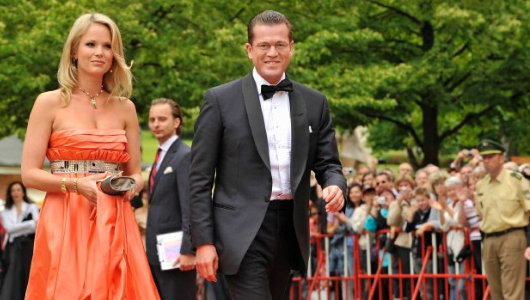
Germany’s new finance minister, Freiherr zu Guttenberg & his wife, Freifrau Stephanie.
Unmentioned by this editorial is that Baron zu Guttenberg’s grandfather (his mother’s father) was the late German winemaker & Croatian politician the Count of Vukovar. From the Count, Baron zu Guttenberg is descended from the noble house of Eltz, who are responsible for one of my favourite castles in the whole world, Burg Eltz, which once graced the 500-deutschmark note.
At the ripe age of 70, the Count of Vukovar took up arms in defence of the town of Vukovar during the Yugoslav Wars of 1991. The Count was elected to the Croatian parliament the following year as an independent, and served in that body until 1999, when he retired from politics. Nonetheless, the Croatian parliament persuaded him to accept honourary membership of parliament in his own right, in which role he continued until his death in 2006.
The Baron’s wife, meanwhile, is Stephanie, Countess of Bismarck-Schönhausen, great-great-granddaughter of the “Iron Chancellor”, Otto von Bismarck. A portent of this economics minister’s future?
David Kerr for Glasgow North East
 While the baggage-handler and much-celebrated hero of the Glasgow Airport attacks, Mr. John Smeaton QGM (“This is Glasgow; we’ll set aboot ye. … You’re no’ hitting the Polis mate, there’s nae chance.”) has announced he is going to contest the Glasgow North East by-election for some fringe electoral outfit, this blog is happy to report that there is already a perfectly laudable candidate who is seeking the privilege of serving the constituents of that district at Westminster.
While the baggage-handler and much-celebrated hero of the Glasgow Airport attacks, Mr. John Smeaton QGM (“This is Glasgow; we’ll set aboot ye. … You’re no’ hitting the Polis mate, there’s nae chance.”) has announced he is going to contest the Glasgow North East by-election for some fringe electoral outfit, this blog is happy to report that there is already a perfectly laudable candidate who is seeking the privilege of serving the constituents of that district at Westminster.
Mr. David Kerr, a Catholic graduate of the University of St Andrews and until recently a senior editor of BBC Scotland’s “Reporting Scotland” programme, is the Scottish Nationalist candidate for Glasgow North East. The Labourite newspapers have already set David Kerr as the target of their sleaze machine, first for a derogatory comment about Glasgow Caledonian University “not having a reputation to tarnish” made in a jocular spirit of inter-academic rivalry, then over a television investigation into the availability of weaponry in which Mr. Kerr was pictured with… well, weapons! (Oh, the horror! Vote Labour!)
Mr. Kerr is believed to be a favourite of SNP leader Alex Salmond, the First Minister of Scotland. The SNP are currently the only major party in mainland Britain who are actively pursuing the Catholic vote. While SNP members tend to be vaguely left-wing and pro-independence (as is the official party policy), SNP voters are often more traditional or conservative and in favour of preserving some form of union. (The Conservative Party, meanwhile, is frequently perceived as a party for liberal English toffs; a perception reinforced by David Cameron’s leadership). The Nationalists are doubtless trying to repeat their victory over Labour in last year’s Glasgow East by-election, in which ethical issues are believed to have played a significant role in Labour’s defeat.
The bookmakers Ladbrokes are currently giving David odds of 5/4 in winning the seat, against 4/6 for Labour’s Willie Bain.
‘Dim Tim’ & Chick-lit Bagshawe go twit for tat over “slobbering” devotees of Thérèse
Tim Cheetham, a Labourite councillor in the legendary south Yorkshire town of Barnsley, has expressed his disdain for the enthusiasm his fellow countrymen and women have shown for the beloved Saint Thérèse of Liseux via the medium of Twitter: “With all those slobbering zealots kissing that glass case, I hope it has some mystical power to prevent swine flu.” As Catholic Herald editor Damian Thompson states, “That’s the authentic voice of 21st-century Labour.”
Louise Bagshaw, a “chick-lit” novelist, prospective Tory party candidate, and Woldingham old girl, wasted no time in responding. “Nice to describe faithful Catholics venerating a relic as slobbering zealots. Would you use such bigoted language about Muslims?”
Cheetham’s rather lame retort: “As the church has issued new guidlines [sic] about the conduct of ceremonies to protect against spreading disease, it needed saying.”
Bagshawe: “Labour’s anti-Catholicism is breathtaking sometimes.”
Damian Thompson continues:
Another tweet from Cheetham: “It’s not Bigotry to highlight the lunacy of dark age mysticism in the modern world.” Really? OK, then let me put you on the spot, councillor.
You say: “I will decry any faith that denies my right to question it in whatever form I wish.” Well, Muslims in Barnsley do object to the slightest criticism of their Prophet (who lived during the dark ages, as it happens) with his child wives and message of violence. But you’re a brave man, it seems. So go on: speak fearlessly and with your trademark withering disdain about the zealots in your own town.
Dim Tim later tried to backtrack by blaming the medium of Twitter for his own idiotic remarks.
To my knowledge, Barnsley’s not a town short on Catholics. Let’s hope those “slobbering zealots” make it to the polling place the next time the council’s up for election.
Prague Prince Propels Pristine Party
New Grouping May Hold Balance of Power After Next Bohemian Vote
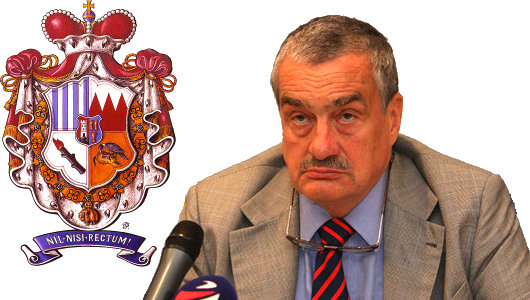
PRINCE KARL VII, current head of the House of Schwarzenberg and sometime foreign minister of the Czech Republic, recently combined with other political colleagues to form a new party in time for the upcoming parliamentary elections in Bohemia. A number of supporters of the Christian & Democratic Union – Czechoslovak People’s Party (KDU-ČSL) were disappointed with the selection of the left-leaning Cyril Svoboda as party chairman, and have formed a new conservative group, Tradice Odpovědnost Prosperita 09 or “Tradition Responsibility Prosperity ’09″.
Prince Karl — or Karel Schwarzenberg as he is known for electoral purposes — suggests that Bohemian voters have grown disenchanted with the current choice of political parties on offer. “The results of the last elections – the worst were the election to the European Parliament, but even the national elections – show that the degree of support for political parties by Czech citizens is going steadily down,” the Prince told Radio Prague.
“People are evidently not content with the parties that are offered to them, and they are more and more fed up. I read this in the e-mails I get and letters, and hear it in pubs and wherever. And as we think that there is still a lot of work to be done in our country, we decided to offer at least some alternative. That’s it.” (more…)
The March Against Socialism
America: Has the Old Girl Got Some Life in Her Yet? Difficult to Say.
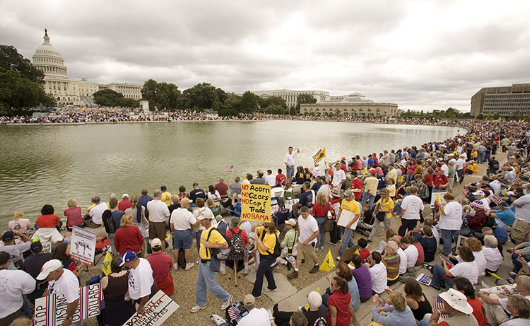
AMERICA CONTINUES TO surprise me. After eight horrible years of a Trotskyite policy abroad under Mr. Bush & co., Americans are now up in arms over Mr. Obama’s proposals to have a socialist domestic policy in addition to our revolutionary foreign policy. And rightly so! But one can’t help but wonder: why weren’t these folks protesting four years ago? Better late than never, I suppose. I still won’t be placing any bets on America — though if the bet is made in U.S. dollars, it won’t matter whether you win or lose as it’d be worthless all the same — but protests like these make me wonder if this country might have a future after all. (more…)
Hey Washington
How’s that piss-off-the-Russians-no-matter-what-the-cost policy turning out for you? Oh? Not so good?
Whiskey Tango Foxtrot
Followers of recent news in right-wing French politics will be able to decipher this text message:
I hope to share more thoughts on this controversial subject when I get back to New York in September, but I’m busy settling my affairs in Africa this week, then hunkering through Edinburgh & London the following weeks, before I return to the glories of uncapped internet access. Until then, it can be followed in French at Le Salon Beige, among other blogs.
Seanad Éireann
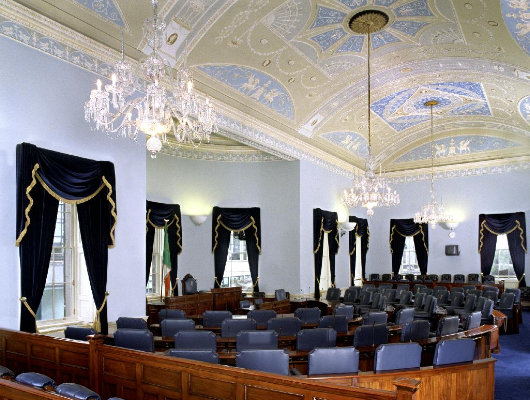
Ireland’s senate is a curious creature. Its first members were co-opted & appointed and these included seven peers, a dowager countess, and five baronets and knights, twenty-three Protestants, and a Jew. Among this cast of characters were W. B. Yeats, General Sir Bryan Mahon, and the physician-poet-author Oliver St. John Gogarty. In 1937, however, the Seanad Éireann took its current form, and since the abolition of the Bavarian upper house in 1999, the Seanad is (so far as my research can discover) the last corporately organised parliamentary body in Europe.
There are sixty members of the Irish senate, who are chosen by a variety of means. (more…)
The Prime Minister of China who became a Benedictine Abbot
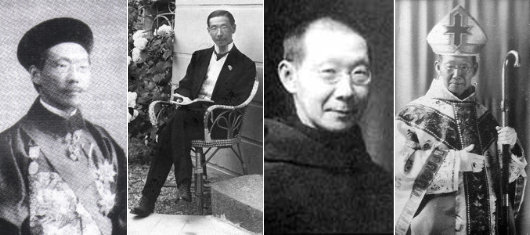
CHRISTIANITY HAS A LONG and varied history in China stretching over at least one-and-a-half millenia. The ancient country has even had Christian leaders, such as the Congregationalist founder of the Chinese Republic, Sun Yat-sen, and his Methodist successor, Gen. Chiang Kai-shek (head of the Kuomintang for nearly forty years). Still, until I read this fascinating story in the Catholic Herald I had no idea that there was a Prime Minister of China, Lou Tseng-tsiang (陸徵祥), who ended his days as a Benedictine monk by the name of Dom Pierre-Célestin. Lou was born a Protestant in Shanghai in 1871, but married a Belgian woman and eventually converted to Catholicism. Serving his country in the diplomatic arena, he accomplished extensive reforms of the Ministry of Foreign Affairs, avoided becoming part of any of the various factions that divided the government, and was one of the founding members of the Chinese Society of International Law. Lou bravely stood up to the indignities imposed upon China through the 1919 Treaty of Versailles by refusing to sign the shameful document which sewed the seeds of future disaster.
Xu Jingcheng, Lou’s mentor and sometime Ambassador to the Court of the Tsars in St. Petersburg, instructed the up-and-coming diplomat that “Europe’s strength is found not in her armaments, nor in her knowledge — it is found in her religion. … Observe the Christian faith. When you have grasped its heart and its strength, take them and give them to China.”
After the death of his wife, Lou became a Benedictine monk at the abbey of Sint-Andries in Flanders, and was eventually ordained a priest in 1935. A decade later, Pope Pius XII — who cared deeply for the Church in China and finally settled the long-standing dispute over Chinese ancestor-honouring rituals in favour of the practices — appointed him titular abbot of the Abbey of St. Peter in Ghent. Sadly, the Chinese Civil War prevented Dom Pierre-Célestin from returning to China, and he died in Flanders in 1949.
The words of Lou’s mentor that Europe’s strength is her faith found recent confirmation from Professor Zhao Xiao, a prominent Chinese economist at the University of Science & Technology Beijing. Prof. Zhao, a member of the Chinese Communist Party, began studying the differences between the economies of Christian societies and those of non-Christian societies. As a result of his investigations, he argued that Christianity would provide a “common moral foundation” for China that would help the economy by reducing corruption, narrowing the gap between rich and poor, preventing pollution, and promoting philanthropy.
“A good business ethic or business morality,” Prof. Zhao says, “can provide for a type of motivation that transcends profit seeking. Why do people want to do business? The main goal would be to earn money. The purpose of a company is to maximize profits. But this can cause companies to look for quick results and nearsighted benefits. It can cause companies to disregard the means and earn money at the expense of destroying the environment, society and the livelihood of others, or endangering the entire competitive environment of the trade.”
“If my motivation for doing business is the glory of God, there is a motivation that transcends profits. I cannot go and use evil methods. If I used some evil methods to enlarge the company, to earn money, then this is not bringing glory to God. Therefore, this is to say that it [bringing glory to God] can provide a transcendent motivation for business. And this kind of transcendental motivation not only benefits an entrepreneur by making his business conduct proper but it can also benefit the entrepreneur’s continued innovation.” (more…)
Of tribes and traditions
In tribal Africa, Ghaddafi expounds traditional government; Meanwhile ethnic Romanians vote to be ruled by their German neighbours.
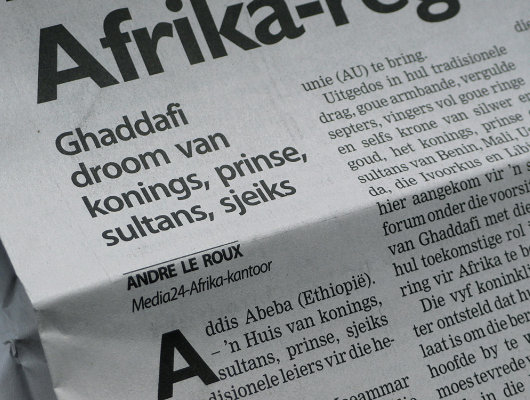
«Ghaddafi dreams of kings, princes, sultans, sheiks»
reports the Afrikaans newspaper Die Burger.
ONE OF THE LESS-REPORTED aspects of the selection of Col. Moammar al-Ghaddafi, the tent-dwelling Libyan leader and notorious eccentric, as Chairman of the African Union was his proposal that an upper house of “kings, princes, sultans, sheiks, and other traditional leaders” be added to the Pan-African Parliament. Col. Ghaddafi has been forthright in his condemnation of democracy as ill-suited to the African continent. “We don’t have any political structures [in Africa], our structures are social,” he explained to the press. Africa is essentially tribal, the argument goes, and as such multi-party democracy always develops along tribal lines, which eventually leads to tribal conflict and warfare. “That is what has led to bloodshed,” the AU chairman posited, citing the recent example of the Kenyan elections.
Europe, of course, solved the matter of tribal difficulties by brutally uprooting long-established peoples from their native lands after the Second World War and transferring them to jurisdictions in which they would ostensibly be part, not only of the majority, but of theoretically “national” states. Cities with centuries of Polish history became Soviet, towns as German as sauerkraut became Polish, and so on and so forth. Sometimes the undesired populations of multi-ethnic places were cruelly murdered, as recent revelations from the police in Bohemia have shown.
Still, remnants of the old cosmopolitan order remain. (more…)
The eternal specter of the National Party
Above: Irish journalist Fergal Keane interviews a poor black South African.
This recent general election in South Africa marked the first time since 1910 — the year the country was unified as an independent dominion — that voters weren’t given the option of voting for the Nationalists. The party was founded in time for the 1914 election, and first entered government in coalition with the Labour party in 1924, but their most famous victory was in the general election of 1948. It was then that they won an outright majority and introduced the ideology of apartheid. The famous Brazilian counter-revolutionary Dr. Plinio Corrêa de Oliveira was of the opinion that South Africa had been in the process of developing a genuinely feudal society until the introduction of apartheid put a full-stop to this evolution.
Evil and heretical though apartheid was, such are the wounded and fearful hearts of men that it won for the National Party each successive general election until the introduction of universal suffrage in 1994. Admittedly, a large proportion of the Nationalist vote was not necessarily a vote for apartheid but instead a vote against communism. Soviet-backed communist subversion escalated sharply throughout Africa in the 1950s, especially as Nelson Mandela launched his internal coup taking over the previously broad-based & non-violent African National Congress and transforming that body into an officially and openly Soviet-aligned group with a terrorist wing whose activities rightly landed him in jail.
With the end of apartheid, the Nationalists had to contend with a universal adult electorate of every South African over eighteen years of age. In 1989, the last election under apartheid, over 2,000,000 whites, 261,000 coloureds (mixed-race people), and 154,000 Indians took advantage of their right to vote. In 1994, meanwhile, over 19.5 million voted. Most interestingly, the votes of the (mostly Afrikaans-speaking) coloured population — whose right to vote was taken away by the Nationalists in the 1950s before being quasi-reintroduced in 1984 — turned around and voted for the National Party en masse, out of fear for the behemoth of the black-dominated ANC.
The party still came second in the 1994 election with 20% of the vote — a respectable result considering the massive media push supporting Mandela & the ANC. But the National Party refused to take advantage of their showing. Under their supremely naïve leader, F. W. de Klerk, instead of forming a noticeable opposition to the ANC behemoth and thus laying the foundations for a robust tradition of antagonistic government and opposition debating eachother, the Nationalists did the worse thing imagineable and actually joined the government (as did the leaders of the black-conservative Inkatha Freedom Party). Had the Nationalists & Inkatha joined forces then as a united multi-racial moderate conservative opposition to the ANC, South Africa’s democracy would be in a much healthier state than it is today. Instead, they chose the gravy train and the voters have punished them in every subsequent election.
For their sins of opportunism, the Nationalists were rightly abandoned by voters and eventually the party dissolved itself and more-or-lessed merged into the ANC they had spent decades proclaiming the dangers of. Marthinus van Schalkwyk, the last leader of the Nationalists, is today an ANC member and cabinet minister. (Here I must concede that he is actually quite a capable minister and was a very sound conservationist as Minister for the Environment; his current portfolio is Tourism).
So April 2009 was the first general election since the dissolution of the National Party. F. W. de Klerk cast his vote in front of the news cameras and refused to divulge which of the parties got his vote, except that it was for an opposition party. Nonetheless, there were a number of eccentric parties which positioned themselves as new-born versions of the Nationalists. One, founded by a known charlatan and fraudster, actually claimed the name “National Party” and was quite multi-racial in its composition with a broadly populist agenda. Another, the “National Alliance“, was a primarily coloured group based in the Northern Cape. Both, however, used variants of the sun logo employed by the old Nationalists. How did they do? Well, rather predictably, convincing voters to back a party whose two best-known polices are first, apartheid, and second, sucking up to the ANC, was not an easy task. Both parties of a neo-Nat persuasion failed miserably, and I think it’s safe to say we’ll hear little of them again.
Still, the National Party’s forty-six straight years in power obviously impacted the history of this country, and their legacy lurks like a specter in the back of the minds of many. Eccentrics who try to resurrect this dead corpse, however, will swiftly be relegated to the cabinet of curiosities.
Engineering Democracy in Poland
This is the text of a talk given by Professor Jerzy Przystawa of the University of Wrocław in Poland. Prof. Przystawa is a physicist who specialises in quantum theory, and has been an active civic intellectual as well. He has also participated in the TriaLogos Festival run by the Foundation Hereditas in Tallinn, Estonia.
by JERZY PRZYSTAWA — 22 JULY 2000
“Sensible” democracy and “sensible” sovereignty
By the end of 1918, after generations of fighting and struggling for a free and independent Poland, the Polish people had created their first truly free and independent state for 123 years. However, the independent Polish State merely survived two decades. 71 years later, the first non-communist Prime Minister in the so-called Eastern Europe, Tadeusz Mazowiecki, proclaimed, in the famous shipyards of Gdańsk, that “Poland lives! Free and Independent!”. The majority of the Polish people readily welcomed the newly acquired freedom.
Since that time many factors began to cloud this rosy picture and many people in Poland now have doubts if the contemporary world is indeed interested in a “free and independent Poland” and that the powers of the West, who are somehow considered to be the godfathers of this new Polish State, indeed intend to create something like a sovereign, self-governing Poland. About a month ago, an important American politician, former security adviser and Secretary of State in the Carter administration, Professor Zbigniew Brzeziński, was receiving his honorary doctorate at the prestigious Jagiellonian University in Krakow. In his solemn address to the learned audience, when he proclaimed “the best decade in the entire Polish history”, he did not dwell upon the question of sovereignty and independence. He rather reappealed to the Poles, a number of times, for “wisdom” and “sensible” or “reasonable democracy”. He did not state exactly what “sensible democracy” he had in mind. But from the general context of his speech there can be little doubt that the “sensible Polish state” should be a state with “limited freedom”, “limited independence”, and “limited sovereignity”. It is then also clear that this “sensible democracy” must also be a “limited democracy”.
How to “engineer” democracy?
There are many ways in which to limit the sovereignty and democracy of the states that emerged after the collapse of the Soviet Union. Perhaps the most important is the exploitation of the enormous economical superiority of the West over the impoverished Eastern societies and the ideas of the so called “free” and “open” international markets. However, it is not my intention to discuss how these countries, unable, under the circumstances, to efficiently compete with the West, are becoming, by economical measures, subordinated and subjugated to foreign rule. I shall also not speak about the rules imposed on our countries by the demands of the European Union. It is the liberty of a free country to make treaties and impose any limitations on its functioning to which free people may consent. My talk will be devoted to the political mechanism that may prevent free people from expressing their will in a democratic way and to have their interests properly represented and protected. A major instrument to achieve such a goal are the electoral rules that have been imposed on Poland, and, as a matter of fact, on other post-communist countries as well. This is the so-called Proportional Representation (PR).
Naturally, there are many people, who will maintain that there are various electoral systems in use all over the world and that it is, to a large extent, a matter of taste, which system is chosen for a given country, since none of them is perfect. But let us have a look at what happened after the World War II, when the victorious allies started to engineer democracy in the defeated countries. (more…)
Enda & Declan

“Now you wouldn’t go scuppering this Lisbon deal we’ve got now wouldja, Mr. Ganley?” Mr. Enda Kenny of Fine Gael (left) meets Mr. Declan Ganley of Libertas (right).
While I am accused of being Fine Gael by tribe & temperament, there’s no doubting that party’s been heading in the wrong direction for several decades now. Once moderate in the face of supposed republican extremism, it is now a banal shell of its former self. (Who would Gen. Mulcahy vote for today, one wonders). Those who have the opportunity of voting in the current European elections will doubtless consider voting for Mr. Ganley’s Libertas party, which is running candidates in quite a number of EU member states, including the United Kingdom.
From my inbox
For the record, given that white males launched Roe & have sustained it ever since, the above is a hope all serious Catholics cannot but share.
Pax tibi – [Redacted]
Zuma’s Day
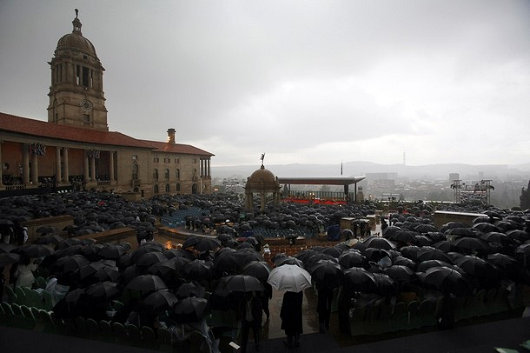
“PRAETORIA PHILADELPHIA” — Pretoria of Brotherly Love — was the formal name for the paramount of South Africa’s three capital cities. Pretoria, the jacarandastad, is home to the Executive; Cape Town, die moederstad, is home to the Parliament, and Bloemfontein, the “City of Roses”, is home to the High Court of Appeal. While the politics of government take place in Cape Town, its actual administration takes place in Pretoria, and all that flows forth from the stately Union Buildings that preside over the city from atop Meintjieskop. The Uniegebou is composed of two wings that come together in a semicircular amphiteatre, symbolizing the coming-together of Briton & Boer in the Union of South Africa. Designed by Sir Herbert Baker, Lutyens’ lieutenant in the building of New Delhi, some believe it to be his finest work.
Some Words from Doorn on the Present Crisis
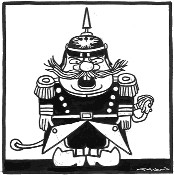 Loyal commenter Steve M. sends word that Kaiser Wilhelm II (currently of Doorn, the Netherlands) has written an open letter to His Excellency President Barack Obama of the United States.
Loyal commenter Steve M. sends word that Kaiser Wilhelm II (currently of Doorn, the Netherlands) has written an open letter to His Excellency President Barack Obama of the United States.
His Imperial Majesty objects to the current practice of appointing “czars” to deal with the various crises at hand, and offers a few alternative suggestions of his own.
Our readers will, no doubt, recall the Kaiser from his previous appearances on his blog here, here, and here.
Count von Stauffenberg: “We Live in a Society of Lemmings”
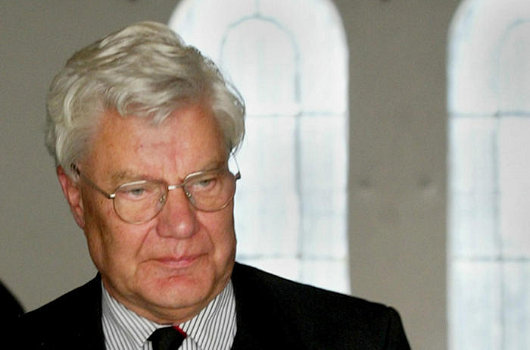
Count Franz Ludwig von Stauffenberg, the third son of Hitler’s would-be assassin Count Claus von Stauffenberg and brother to Gen. Berthold von Stauffenberg, recently spoke to the German magazine FOCUS about Germany’s ratification of the Lisbon Treaty. Stauffenberg, a father of four and grandfather of eight, has spent his life as an attorney and a politician for the Bavarian Christian Social Union party, serving in the Bundestag from 1976 to 1987 and as a Member of the European Parliament from 1984 to 1992.
FOCUS asked the Count about his participation in the German court challenge against the Lisbon Treaty.
“I see the way to [the Constitutional Court] as a last resort,” the Count said, “and had hoped that we could compel a re-think through an ordinary democratic manner, through argument, debate, and public pressure. This has totally failed. I’m not anti-European; I was long enough a CSU Member of the European Parliament. This Europe is no longer compatible with the basic structures of a democratic legal state.”
FOCUS: Has your case something to do with your experience as the son of the resistance fighter Count von Stauffenberg?
“No. My father expected that his children would … stand on their own as a man or woman. I didn’t go into politics from devout worship of my father, but because of the unsuccessful paths of my peers from the generation of 1968.”
FOCUS: Your action comes late. Why have you waited so long?
“In Brussels, there was no sudden seizure of power, but a systematic, persistent development, in which the Bundestag deputies, constantly obedient and even docile, incapacitated themselves. They see themselves as a reserve team for higher office rather than in their actual role as inspectors to reflect, as a counter force on equal footing.”
FOCUS: How can it be that so few see a risk in the Lisbon Treaty, and the rest should be so beaten with blindness?
“In Germany, almost no one wanted to hear concerns. We live in a society of lemmings.”
Link: Graf Stauffenberg: “Wir leben in einer Gesellschaft von Lemmingen” (In German)
‘German’ Poland vs. ‘Russian’ Poland
A curiosity of the 2007 Polish parliamentary election
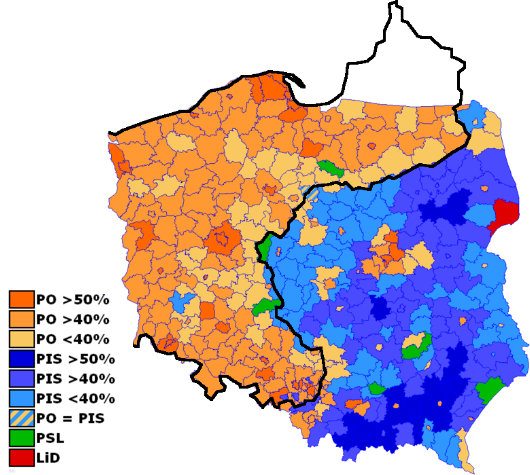
THIS MAP displaying the results of the 2007 general election for the Polish parliament is overlaid with an outline of the nineteenth-century border between the German and Russian empires.
The areas formerly ruled by the German Kaiser tend to back the right-wing liberal Platforma Obywatelska (“Civic Platform”) party, while those formerly ruled by the Tsar tend to support the conservative Prawo i Sprawiedliwość (“Law and Justice”) party.
The green represents the centrist-agrarian Polish People’s Party, while the dark red represents the already-defunct “Left and Democrats” coalition.
Source: Strange Maps
Victory in Uruguay
Leftist president defies his own coalition, vetoes bill to legalize abortion.
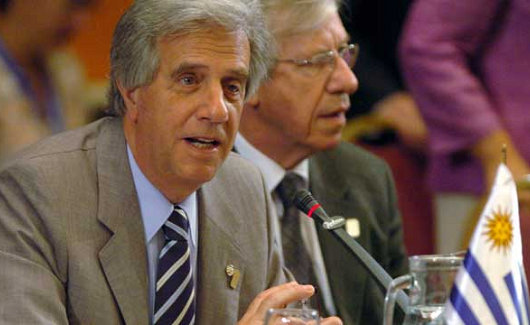
The President of Uruguay, Dr. Tabaré Vázquez, has vetoed a bill passed by the two chambers of the country’s congress that would overturn the ban on abortion. Pre-natal infanticide has been illegal in Uruguay since 1938, and the left-wing Frente Amplio coalition that has a congressional majority sought to enact one of the most permissive abortion laws in Latin America. While President Vázquez, an oncologist by training, is a member of the Frente Amplio party, his constituent group in the alliance is the Christian-Democratic Party which proclaims as part of its platform an “absolute respect for human rights”. The veto sends the bill back to the congress, where the Frente does not have the two-thirds majority necessary to override the veto.
Search
Instagram: @andcusack
Click here for my Instagram photos.Most Recent Posts
- Gellner’s Prague December 19, 2024
- Monsieur Bayrou December 18, 2024
- Dempsey Heiner, Art Critic December 17, 2024
- Vote AR December 16, 2024
- Articles of Note: 12 December 2024 December 12, 2024
Most Recent Comments
Book Wishlist
Monthly Archives
Categories


